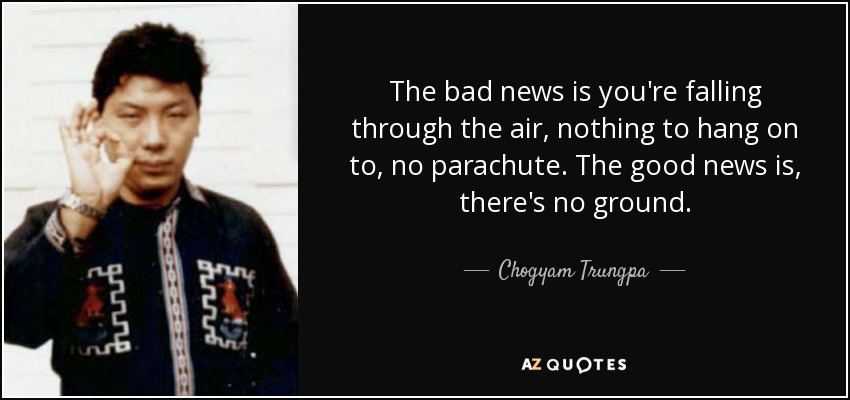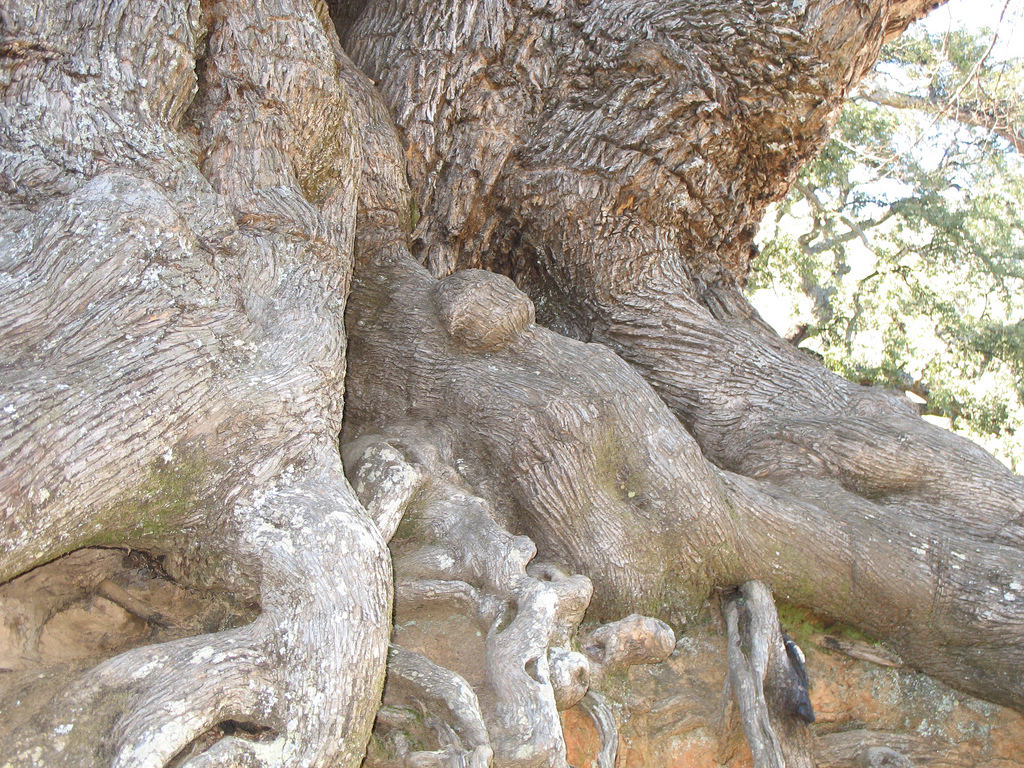All at once the veil is torn away, I have understood, I have seen…. The roots of the chestnut tree sank into the ground just beneath my bench. I couldn’t remember it was a root anymore. Words had vanished and with them the meaning of things, the ways things are to be used, the feeble points of reference which men have traced on their surface. I was sitting, stooping over, head bowed, alone in front of this black, knotty lump, entirely raw, frightening me. Then I had this vision.
It took my breath away. Never, up until these last few days, had I suspected the meaning of “existence.” I was like the others, like the ones walking along the seashore, wearing their spring clothes. I said, like them, “The sea is green; that white speck up there is a seagull,” but I didn’t feel that it existed or that the seagull was an “existing seagull”; usually existence conceals itself. It is there, around us, in us, it is us, you can’t say two words without mentioning it, but you can never touch it. When I believed I was thinking about it, I was thinking nothing, my head was empty, or there was just one word in my head, the word “being.” Or else I was thinking — how can I put it? I was thinking of properties. I was telling myself that the sea belonged to the class of green objects, or that green was one of the qualities of the sea. Even when I looked at things, I was miles from dreaming that they existed: they looked like scenery to me. I picked them up in my hands, they served me as tools, I foresaw their resistance. But that all happened on the surface. If anyone had asked me what existence was, I would have answered in good faith, that it was nothing, simply an empty form added to things from the outside, without changing any thing in their nature. And then all at once, there it was, clear as day: existence had suddenly unveiled itself. It had lost harmless look of an abstract category: it was the dough out of which things were made, this root was kneaded into existence. Or rather the root, the park gates, the bench, the patches of grass, all that had vanished: the diversity of things, their indi viduality, were only an appearance, a veneer. This veneer had melted, leaving soft, monstrous lumps, in disorder — naked, with a frightful and obscene nakedness.
I kept myself from making the slightest movement, but I didn’t need to move in order to see, behind the trees, the blue columns and the lampposts of the bandstand and the Velleda, in the middle of a clump of laurel. All these objects — how can I put it? They made me uncomfortable. I would have liked them to exist less forcefully, more dryly,more abstractly, with more reserve. The chestnut tree pressed itself against my eyes. Green blight covered it halfway up; the bark, black and swollen, looked like boiled leather. The sound of the water in the Masqueret Fountain trickled in my ears, made a nest there, filled them with sighs; my nostrils overflowed with a green, putrid odor. All things, gently, tenderly, were letting themselves exist like weary women giving way to laughter, saying, “It’s good to laugh,” in a damp voice; they were sprawling in front of each other, abjectly confessing their existence. I realized there was no mean between non-existence and this swooning abundance. If you existed, you had to exist to excess, to the point of moldiness, bloatedness, obscenity. In another world, circles, musical themes keep their pure and rigid lines. But existence is a yielding. Trees, pillars blue as night, the happy gurgling of a fountain, living smells, little mists of heat floating in the cold air, a red haired man digesting on a bench: all these somnolences, all these digestings taken together, had their vaguely funny side. Funny — no: not quite that, nothing that exists can be funny; it was like a floating, almost entirely elusive analogy, to certain situations in vaudeville. We were a heap of existences, uncomfortable, embarrassed at ourselves, we hadn’t the slightest reason to be there. none of us, each one confused, vaguely alarmed, felt superfluous in relation to the others. Superfluous [de trop — literally “too much”] : it was the only relationship I could establish between these trees, these gates, these stones. In vain I tried to count the chestnut trees, to locate them by their relationship to the Velleda, to compare their height with the height of the plane trees: each of them eluded the relations in which I tried to enclose it isolated itself, and overflowed. Of these relations (which I obstinately maintained in order to delay the collapse of the human world, of measurements, quantities, directions) I felt their arbitrariness; these relations no longer bit into things. Superfluous, the chestnut tree there, in front of me, a little to the left. Superfluous, the Velleda.
And I myself — soft, weak, obscene, digesting, juggling with dismal thoughts — I, too, was superfluous Fortunately, I didn’t feel it, rather it was a matter of understanding it; but I was uncomfortable because I was afraid of feeling it (even now I’m afraid — afraid that it might catch me behind my head and lift me up like a wave from the depths). I dreamed vaguely of killing myself to wipe out at least one of these superfluous existences. But even my death would have been superfluous. Superfluous, my corpse, my blood on these stones, between these plants, at the bottom of this smiling garden. And the gnawed flesh would have been superfluous in the earth which would receive my bones, at last, cleaned, peeled, as clean as teeth, it would have been superfluous: I was superfluous for eternity.
The word Absurdity is emerging under my pen; a little while ago, in the garden, I couldn’t find it, but neither was I looking for it, I didn’t need it: I thought without words, on things, with things. Absurdity was not an idea in my head, or the breath of a voice, only this long serpent dead at my feet, this serpent of wood. Serpent or claw or root or vulture’s talon, what difference does it make? And without formulating anything clearly, I understood that I had found the clue to existence, the clue to my nauseas, to my own life. In fact, all I could grasp beyond that comes down to this fundamental absurdity. Absurdity: another word. I struggle against words; beneath me there I touched the thing. But I wanted to fix the absolute character of this absurdity. A movement, an event in the tiny colored world of men is only relatively absurd — in relation to the accompanying circumstances. A madman’s ravings, for example, are absurd in relation to the situation in which he is, but not in relation to his own delirium. But a little while ago I made an experiment with the absolute or the absurd. This root — there was nothing in relation to which it was absurd. How can I pin it down with words? Absurd: in relation to the stones, the tufts of yellow grass, the dry mud, the tree, the sky, the green benches. Absurd, irreducible; nothing — not even a profound, secret delirium of nature could explain it. Obviously I did not know everything, I had not seen the seeds sprout, or the tree grow. But faced with this great wrinkled paw, neither ignorance nor knowledge was important: the world of explanations and reasons is not the world of existence. A circle is not absurd, it is clearly explained by the rotation of the segment of a straight line around one of its extremities. But neither does a circle exist. This root, in contrast, existed in such a way that I could not explain it. Knotty, inert, nameless, it fascinated me, filled my eyes, brought me back unceasingly to its own existence. In vain I repeated, “This is a root” — it didn’t take hold any more. I saw clearly that you could not pass from its function as a root, as a suction pump, to that, to that hard and thick skin of a sea lion, to this oily, callous; stubborn look. The function explained nothing: it allowed you to understand in general what a root was, but not at all that one there. That root with its color, shape, its congealed movement, was beneath all explanation. Each of its qualities escaped it a little, flowed out of it, half solidified, almost became a thing; each one was superfluous in the root and the whole stump now gave me the impression of uncoiling out of itself a little, denying itself, losing itself in a frenzied excess. I scraped my heel against this black claw: I wanted to peel off some of the bark. For no reason at all, out of defiance, to make the bare pink of a scratch appear absurd on the tanned leather: to play with the absurdity of the world. But, when I drew my heel back, I saw that the bark was still black. Black? I felt the word deflating, emptying of meaning with extraordinary rapidity.
Black? The root was not black, there was no black on this piece of wood — there was something else black, like the circle, did not exist. I looked at the root: was it more than black or almostblack? But I soon stopped questioning myself because I had the feeling of knowing what the score was. Yes, I had already scrutinized innumerable objects, with deep uneasiness. I had already tried — in vain — to think something about them: and I had already felt their cold, inert qualities elude me, slip through my fingers….Weird [louche, literally “squinting” but here suggesting ambiguity]: that’s what they were, the sounds, the smells, the tastes. When they ran quickly under your nose like startled hares and you didn’t pay too much attention, you might believe them to be simple and reassuring, you might believe that there was real blue in the world, real red, a real perfume of almonds or violets. But as soon as you held on to them for an instant, this feeling of comfort and security gave way to a deep uneasiness: colors, tastes, and smells were never real, never themselves and nothing but themselves. The simplest, most unanalyzable quality had too much content for itself, was superfluous at heart. That black against my foot, it didn’t look like black, but rather the confused effort to imagine black by someone who had never seen black, and who wouldn’t know where to stop, who would have imagined an ambiguous being beyond colors. It looked like a color, but also — like a bruise or a secretion, like an oozing — and like something else, a smell, for example, it melted into the smell of damp earth, warm moist wood, into a black smell that spread like varnish over this nervous wood, in a flavor of chewed, sweet fiber. I did not simply see this black: sight is an abstract invention, an idea that has been cleaned up, simplified, one of man’s ideas. That black there, amorphous, weakly presence, overflowed sight, smell, and taste. But this exuberance became confusion and finally it was no longer anything because it was too much.
This moment was extraordinary. I was there, motionless, paralyzed, plunged in a horrible ecstasy. But at the heart of this ecstasy, something new had just appeared; I understood the nausea, I possessed it. To tell the truth, I did not formulate my discoveries to myself. But I think it would be easy for me to put them in words now. The essential point is contingency. I mean that by definition existence is not [logical] necessity. To exist is simply … to be there; existences appear, let themselves be encountered, but you can never deduce them. Some people, I think, have understood this. Only they tried to overcome this contingency by inventing a being that was necessary and self-caused. But no necessary being [i.e., God] can explain existence: contingency is not a delusion, an appearance which can be dissipated; it is the absolute, and, therefore, perfectly gratuitous. Everything is gratuitous, this park, this city, and myself. When you realize this, your heart turns over and everything begins to float….
How long will this fascination last? I was the root of the chestnut tree. Or rather I was entirely conscious of its existence. Still detached from it — since I was conscious of it — yet lost in it, nothing but it. A consciousness which was uneasy but nevertheless let itself fall with all its overhanging weight on this piece of inert wood. Time had stopped: a small black pool at my feet; it was impossible for something to come after this moment. I would have liked to tear myself away from that atrocious joy, but I did not even imagine it would be possible. I was inside; the black stump did not move, it stayed there, in my eyes, as a lump of food sticks in the windpipe. I could neither accept nor refuse it. What effort it took to raise my eyes! Did I raise them? Rather did I not obliterate myself for a moment in order to be reborn in the following moment with my head thrown back and my eyes raised upward? In fact, I was not even conscious of the transition. But suddenly it became impossible for me to think of the existence of the root. It was wiped out, I could repeat in vain, it exists, it is still there, under the bench, against my right foot. It no longer meant anything. Existence is not something which lets itself be thought of from a distance; it must invade you suddenly, master you, weigh heavily on your heart like a great motionless beast. — Or else there is nothing more at all.
There was nothing more, my eyes were empty and I was spellbound by my deliverance. Then suddenly it began to move before my eyes in light, uncertain motions; the wind was shaking the top of the tree.
It did not displease me to see something move; it was a change from these motionless existences who watched me like staring eyes. I told myself, as I followed the swinging of the branches: movements never quite exist, they are processes, transitions between two existences, moments of weakness. I expected to see them come out of nothingness, ripen by stages, blossom; at last I was going to surprise existences in the process of being born.
No more than three seconds and all my hopes were swept away. Viewing these hesitant branches groping around like blind men, I could not succeed in grasping the process of coming into existence. This idea of process was a human invention. An idea too clear. All these trifling agitations, each of them, asserted themselves. They overflowed the leaves and branches everywhere. They whirled around these dry hands, enveloped them with tiny whirlwinds. Of course a movement was something different from a tree. But it was still an absolute. A thing. My eyes only encountered fullness. The tips of the branches were seething with existences which unremittingly renewed themselves and which were never born. The wind existing had just lighted on the tree like a huge fly, and the tree was shuddering. But the shudder was not an emerging quality, a process from potentiality to actuality; it was a thing; a shudder-thing flowed into the tree, took possession of it, shook it, and suddenly abandoned it, going further on to twist about itself. All was fullness and all was active, there was no weak moment in time; all, even the most imperceptible stirring, was mode of existence….
Had I dreamed this enormous presence? It was there, deposited on the garden, tumbling down in the trees, all soft, sticky, soiling everything, all thick, a jelly. And I, was I inside, with the garden? I was frightened, furious, I thought it was so stupid, so out of place. I hated this ignoble messiness. Piling up to the sky, spilling over, filling everything with its gelatinous slither, and I could see depths upon depths of it reaching far beyond the limits of the garden, the houses, and Bouville, as far as the eye could reach. I was no longer in Bouville; I was nowhere, I was floating. I was not surprised, I knew it was the World, the naked World revealing itself all at once, and I choked with rage at this gross absurd being. You couldn’t even ask where all this came from, or how it was that a world existed, rather than nothingness. It didn’t have any meaning, the world was present everywhere, before, behind. There had been nothing before it. Nothing. There had never been a moment in which it could not have existed. That was what bothered me; of course there was no reason for its existing, this flowing larva. But it was not possible for it not to exist. It was unthinkable: to imagine nothingness you had to be there already, in the midst of the World, eyes wide open and alive; nothingness was only an idea in my head, an existing idea floating in this immensity; this nothingness had not come before existence, it was an existence like any other and ap peared after many others. I shouted, What filth, what filth! And I shook myself to get rid of this sticky filth, but it held and there was so much, tons and tons of existence, endless. I suffocated at the bottom of this immense weariness. And then, all at once, the park emptied as through a great hole. The world disappeared as it had come, or else I woke up — anyway I saw no more of it; nothing was left but the yellow earth around me, out of which dead branches rose upward.
I got up and went out of the park. Once at the gate, I turned around. Then the garden smiled at me. I leaned against the gate and watched for a long time. The smile of the trees, of the clump of laurel, meant something: that was the real secret of existence. I remembered one Sunday, not more than three weeks ago. I had already detected everywhere a sort of conniving mood. Was it addressed to me? I felt with weariness that I had no way of understanding. No way. Yet it was there, waiting, a sort of look. It was there on the trunk of the chestnut tree — it was the chestnut tree. Things — one might have said thoughts — which halted halfway, which were forgotten, which forgot what they wanted to think and which stayed like that, hanging around with an odd little meaning which was beyond them. That little meaning annoyed me. I could not understand it, even if I had stayed leaning against the gate for a century. I had learned all I could know about existence [namely, that it is inaccessible to the intellect].




